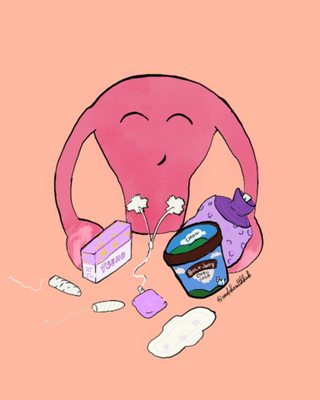Despite almost 1 in 10 women of a reproductive age being affected by endometriosis, few are aware of the onset and symptoms that can lead to it further down the line. Endometriosis is often a hereditary condition and can severely impact a woman's quality of life- impacting their physical, mental and social wellbeing.
Image courtesy of Leesa Joy @endohealthhub.
So what is endometriosis?
Sometimes just referred as 'endo', endometriosis is a common, chronic disease in which cells similar to those usually found in the lining of the uterus (the endometrium) present themselves in other parts of the body, such as the ovaries, fallopian tubes, bladder and other pelvic organs.
What are the symptoms?
Common symptoms include pelvic pain, infertility and severe discomfort during sex- all of which can be felt due to an inflammation of the area. Inflammation often occurs regularly each month, which is why often those affected just think they are having a 'bad period' when the symptoms flare up.
Other symptoms of endometriosis include:
- irregular bleeding
- bleeding between periods
- bloating
- fatigue, often around your period.
Common misconceptions.
'Isn't it just a bad period?'
'It's just part of being a woman'
'Endometriosis equals infertility'
Realising one is suffering from endometriosis can be difficult due to the varying symptoms felt among women and the fact that none of the common symptoms are unique to the condition itself. It's complex onset is one reason why there are so many misconceptions about endometriosis, which is why there can be years of delay between the first symptom and a diagnosis. On average it takes up to 7 years for a diagnosis to happen. Endometriosis isn't just a bad period, it's a chronic condition that affects a woman's quality of life.
It's estimated about 30% of women who live with endometriosis are infertile. Often this is due to scaring of the fallopian tubes, problems with the egg or embryo travelling down the tubes or changes to the organs in the pelvis. With that being said, this only impacts a slice of those living with endometriosis, the majority of women diagnosed are still able to conceive and give birth.
Treatments for endometriosis
Whether to treat endometriosis or not is usually a personal choice- where one must weigh up the risk of treatment against quality of life. Surgery called a laparoscopy is done to remove mild to moderate endometriosis.
Pain relievers or hormonal treatments are often used to relieve common symptoms. Hormonal treatments such as the pill don't “cure” endometriosis, but they may help with controlling pain by stopping your periods and preventing endometriosis from getting worse.

Image courtesy of Leesa Joy @endohealthhub
So what can we do about it?
Check up with your doctor
It takes a tiny slice out of your day to see your local GP if you are having any of the common symptoms of endometriosis, let them know and hopefully you will receive the treatment you need.
Get talking!
The easiest way we can raise awareness about endometriosis is by talking about it. Dropping it into your chats is sometimes all it takes for you, your friends or your colleagues to strike up some awarenesses or consult a doctor to get the medical help they need. We hope by talking more about endometriosis we can help lower that 7 year average statistic for diagnosis for many many women and encourage more funding into research and hopefully finding a cure.
Share your story
Even if some people just swipe past it, getting the word out there is always a good start. If you are living with endometriosis and sharing your experience, not only are you raising awareness, but you might just spur on someone else to get themselves checked. There are tons of blogs and websites that have more information about endometriosis which you can use to educate yourself and others too.
We love the following organisations in Australia:
Pelvic Pain Foundation of Australia
Jean Hailes For Women's Health
Support endometriosis organisations
There are a number of charities and non-profits out there supporting the research into causes, treatments and cures for endometriosis.
In support of endometriosis month, Tsuno will donate 10% of all new online sales to Endometriosis Australia this weekend (Saturday 30th- Sunday 31st March) to support their fantastic efforts around increasing recognition of endometriosis, providing endometriosis education programs, and providing funding for endometriosis research.
Visit our store now!
A huge thank you to Leesa Joy from @endohealthhub for her artwork and images of some of her visits to hospital. If you would like to read more about her experience, support her work to increase awareness and understanding for those suffering from endometriosis, please visit her website Endo Health Hub.




